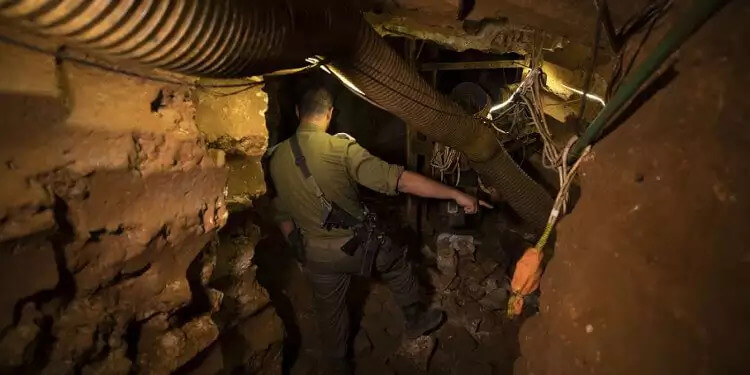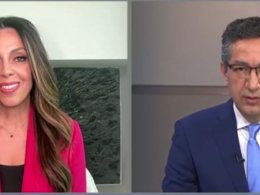It appears that Hezbollah, an Iranian-supported Shiite militant group, possesses a covert tunnel system believed to be more advanced than that of Hamas in the Gaza Strip, according Tal Be'eri, who heads the research department at the Alma Center, an Israel-based think tank focused on studying security challenges in the Middle East.
The report notes that Hezbollah possesses an extensive subterranean network spanning hundreds of kilometers, extending into Israeli territory, with potential extensions into Syria.
"Our assumption is that everything we see in Gaza in the past few months – all this and more is happening in Lebanon," Be'eri said in an interview with Radio North 104.5FM.
"Hezbollah started building in the 1980s, with the help of Iran and North Korea, who brought the professional know-how. The result is a large system of tunnels under Lebanon.”
"Reports in the Middle East have indicated that Iran and Hezbollah militia have been able, over the past many months and even years, to establish what I call a 'jihad line' crossing Mount Lebanon from the Beqaa to the Mediterranean Sea," said Walid Phares, a Newsmax TV Foreign Policy Analyst.
"This strategy by Hezbollah and Iran was actually developed over the past 20 years patiently with Iranian money," Phares told The Foreign Desk.
Phares explained that this zone was "equipped with launching pads and a blockhouse that would allow Hezbollah to establish capabilities for long-range missiles (ICBMS) and drones and anti-aircraft long-range missiles, all provided by Iran and deployed in the center of Lebanon, which will make it very difficult for the Israelis to respond far from south Lebanon in a mountainous area where a majority of the population is Christian."
Be'eri added that the tunnels are "divided into different types."
“The types we are familiar with are the attack tunnels, whose purpose is to cross the fence and invade the Galilee area, but here we are also talking about strategic tunnels that allow people to move from place to place, spread over many kilometers. Unlike the attack tunnels, they allow for the movement of vehicles and even medium-sized trucks," he added," Be'eri told Radio North 104.5FM.
Be’eri estimated that the tunnel network is "hundreds upon hundreds of kilometers" but did not provide an exact number.
"We [Alma Center] follow what is happening in Lebanon, and we see that civilian companies, companies owned by Shi'ites, build different infrastructural projects, especially water transfer projects. You see the ability and the know-how, and to an outside observer, it is clear to everyone that this can result in a tunnel that can be used militarily," he explained to Radio North 104.5FM.
According to Phares, Hezbollah and its local allies "have been able to establish a zone of control in the Middle of the Christian population in Mount Lebanon in the area of Jebeil, also known as Byblos. This is the heartland of the Maronites, and Hezbollah has been able to connect with some Shia villages from the highest peak all the way down to the coast of Lebanon, slicing the whole of Mount Lebanon, a free area in the past, into two zones and cutting the continuity of Christian zones in Lebanon," he added.
The report notes that the tunnels span hundreds of kilometers collectively, with one of the largest stretching to 45 km. Some of the tunnels are designed to be narrow, facilitating the infiltration of terrorists into Israel, while others boast wider dimensions, intended to accommodate Iranian Fateh-110 ballistic missile batteries.
John Spencer, Chair of Urban Warfare Studies at the Modern War Institute, explained that Hezbollah doesn't have a "secret tunnel network but a "well-known vast network of hundreds of kilometers of tunnels varying in complexity and depth."
"The true extent of Hezbollah tunnels may be secret or unknown for sure, but the presence of a vast network of complex tunnels in varying complexity, depth, and purpose from defensive to offensive is very well known," Spencer told The Foreign Desk.
According to Phares, the first question to be asked is why the Lebanese Army, which is equipped and trained by the United States, was unable to "detect this Maginot Line of Hezbollah."
"The answer being that the Lebanese Army is under the control of the Ministry of Defense of the Lebanese government, which is controlled by Hezbollah," he told The Foreign Desk.
"The second point is how come U.S. intelligence did not discover this line of fortifications that can threaten not just Israel but eventually the U.S., as we saw over the past few months in Syria and Iraq? There are no answers, though the Pentagon has already developed an embassy in Lebanon where their resources could have detected these fortifications, and the U.S. has a presence in the North of Lebanon. There is an airbase used by the U.S. Armed Forces called Hamat," he added.
Phares noted that the current situation is "very dangerous" for the anti-Hezbollah coalition in Lebanon, which includes Christians, Sunni, and Druze, because "if Hezbollah launches their barrage of missiles against Israel, it is expected that Israelis would respond and by responding they will cause damage to areas in Mount Lebanon that are supposed to be sympathizers fo the West and Israel."
"How the U.S. government deals with this matter is unknown because it has not been actually raised by the administration despite the fact that most likely they had that information," he added.
Since 1982, Hezbollah's military power in Lebanon has strengthened thanks to the billions of dollars of military and financial support from the Islamic Republic of Iran. Following the Oct. 7 massacre by Hamas, Hezbollah has launched sporadic attacks against Israel's northern border, launching rockets and deploying Hezbollah fighters to try and infiltrate the Jewish state.
"We expect now that a stronger opposition by civil society in Lebanon to Hezbollah is going to rise. The problem is that Hezbollah has the military means to eliminate its enemies. We will wait until the next months to see if the Biden administration will start supporting Lebanese civil society against Hezbollah or if it is going to be a policy to be considered by the next administration," Phares told The Foreign Desk.
Related Story: Hezbollah Will Use Unconventional Weapons Against Israel if War Escalates: Source










